pCloud vs MEGA: Which One Should You Choose in 2025
Anyone looking for a cloud storage solution that has private encryption should consider pCloud and MEGA. Each has great security protocols, although only MEGA has zero-knowledge encryption that protects the whole account. We will look at similarities and differences to help you decide as we compare pCloud vs MEGA.
Key Takeaways: pCloud vs MEGA
- The main difference between pCloud and MEGA is private encryption. pCloud charges extra for an encryption folder, while MEGA has zero-knowledge encryption for the whole account.
- pCloud has excellent file synchronization, as it supports selective sync through the desktop app and lets you determine what to download or leave in the cloud.
- MEGA has a generous free plan with 20GB of cloud storage, upgradable by an additional 10GB for an entire year.
MEGA and pCloud are known as secure and private cloud storage services, and both make our list of the best overall cloud storage providers. However, pCloud and MEGA handle encryption differently and offer a number of different features. We’ll break everything down in this pCloud vs MEGA comparison.
Aside from how each implements private encryption, pCloud and MEGA also occupy different points on the pricing spectrum. That’s not to say they’re all different — there are many commonalities between the two. Below, we’ll look at each cloud storage solution to see how they are alike and where they differ.
-
09/05/2022 Facts checked
Updated article with new information about features, pricing and speed.
-
08/30/2023 Facts checked
This article was rewritten to capture newer cloud storage features and current pricing.
- 1
- :
- :
- :
- :
- 2
- :
- :
- :
- :
How Did We Rate pCloud vs MEGA?
To rate pCloud vs MEGA we spent a lot of time with each service, testing functionality and feature-set. As you’ll see in our pCloud review and MEGA review, we’ve covered both cloud platforms extensively. With this knowledge and experience, we are perfectly suited to compare MEGA vs pCloud.
MEGA vs pCloud: Similarities & Differences
The table below provides a quick snapshot of the features and security that pCloud and MEGA offer. For those who only need a summary, this information was designed for you. For more in-depth information, read on as we take a closer look at MEGA vs pCloud.
10,000+ Trust Our Free Cloud Storage Tips. Join Today!

- Demystify cloud storage terminology and key concepts in plain language
- Discover easy-to-implement techniques to securely backup and sync your data across devices
- Learn money-saving strategies to optimize your cloud storage costs and usage
| Features | ||
|---|---|---|
| 2TB$4.17 / month(All Plans) | 3TB – 100TB$9.74 / month(All Plans) | |
| Review | Review | |
| Sync Folder | ||
| Block-Level Sync | ||
| Selective Sync | ||
| Bandwidth management | ||
| Sync Any Folder | ||
| File Link Sharing | ||
| Link Passwords | ||
| Link Expiry Dates | ||
| Folder Sharing | ||
| Folder Permissions | ||
| Link Download Limits | ||
| Upload Links | ||
| File Previews | ||
| Edit Files | ||
| In-App Collaboration | ||
| Office Online | ||
| Google Docs | ||
| Notes App | ||
| Media Playback | ||
| Mobile Apps | ||
| Deleted File Retention | ||
| Versioning | ||
| WebDAV | ||
| At-Rest Encryption | ||
| In-Transit Encryption | ||
| Encryption Protocol | AES 256-bit | |
| Client-Side Encryption | ||
| Two-Factor Authentication | ||
| Server Location | EU | EU |
| 24/7 Support | ||
| Live Chat Support | ||
| Telephone Support | ||
| Email Support | ||
| User Forum | ||
| Knowledgebase | ||
| Free Plan |
Similarities
MEGA and pCloud handle file and folder sharing in similar ways. We will look at this, along with security, user interface and a few other areas, in the section below.
MEGA vs pCloud: Free Storage
MEGA’s free plan has 20GB of cloud storage space, no strings attached, making it one of the best free cloud storage providers. If you complete a few tasks (engaging with the desktop and mobile app), you can increase the free storage capacity to 30GB of storage space for the first year. If you get friends to install a MEGA app, you’ll get 5GB for each.
pCloud’s free plan normally starts you with 2GB which you can then upgrade to 10GB, but if you sign up through our discount links, the cloud service offers 10GB of free storage space.
File Sharing
File sharing with pCloud is fast and easy, making it one of the best cloud storage providers for sharing. If you want to include collaborators in folders, you can invite them directly using an email address or create a link. Sending invitations by email requires the recipient to have a pCloud account and doesn’t have any additional options.
Those on paid plans have additional options when sharing by link, like adding a password for extra protection or setting a link expiration date. Sharing individual files happens by creating a link. This link has many of the same options as a folder link, including the password and expiration date choices.
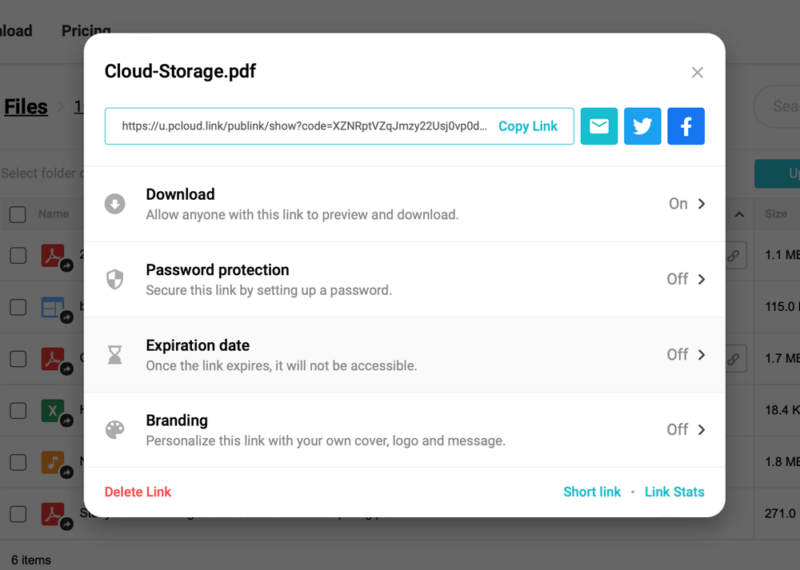
you can add passwords or expiration dates to protect your file transfer.
MEGA handles file sharing similarly. You can invite others directly to a folder by using their email address. Like pCloud, the individuals will need a MEGA account to participate. File sharing only happens with a shareable link. MEGA has additional settings for link sharing included with paid accounts, like adding a password.
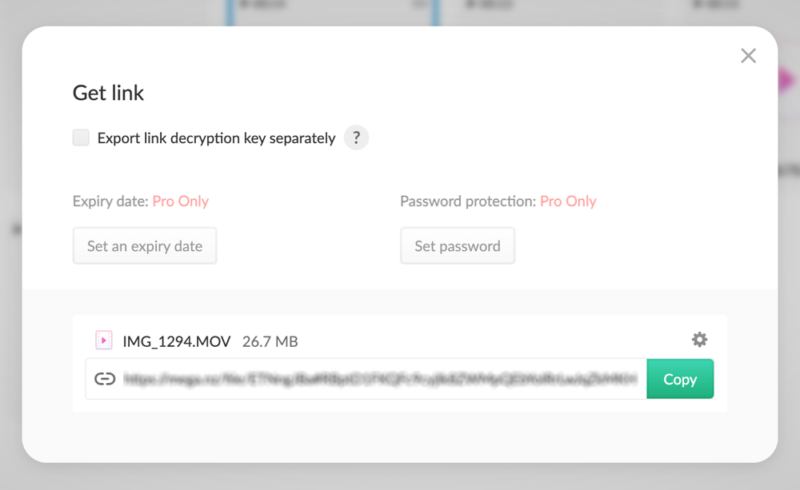
same file to send separately to recipients, for added security.
All of MEGA’s shared links are encrypted, so you can opt to separate the decryption key. Doing so lets you send it separately, which effectively acts as a password. This option is included in every MEGA plan. We have a guide on how to use MEGA links if you’d like to learn more.
Security
pCloud uses AES 256-bit encryption to protect your data while at rest on its servers. AES encryption defends against brute force attacks that use repeated attempts to guess your credentials, such as login information or encryption keys.
For your data in transit, pCloud uses TLS/SSL encryption protocols that protect against man-in-the-middle cyberattacks. A man-in-the-middle attack impersonates the intended recipient to intercept and steal the transferred data.
MEGA uses the same encryption protocols for data at rest and in transit as pCloud. Additionally, both services offer two-factor authentication, which adds a layer of protection to the login process. pCloud’s two-factor authentication relies on the familiar SMS method or Google Authenticator. MEGA only uses dedicated authenticator apps for its two-factor authentication, such as Authy, Duo Mobile or Google Authenticator.
User Interface
MEGA and pCloud have familiar user interface layouts on their respective web applications. Both employ a left sidebar for navigating around your account and make it easy to access your data.
MEGA supports the drag-and-drop method to sort and organize your data or upload files into your account. With pCloud, you can drag and drop files from your computer into your account. However, you can’t use the same method to move items around or organize your folders and files.
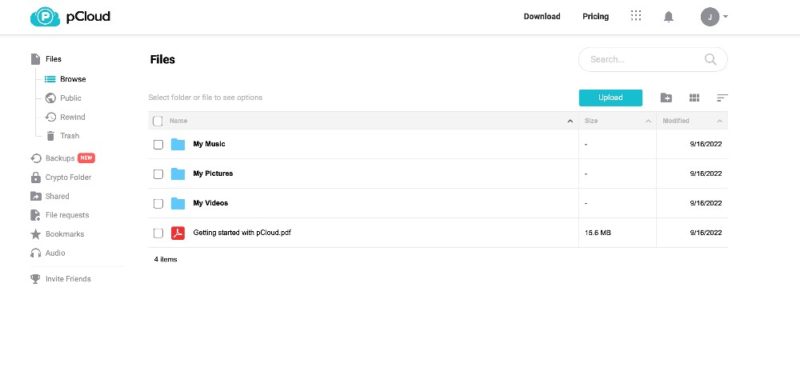
on the left and your content in the middle.
pCloud and MEGA have a robust settings menu to customize areas like notifications and security. MEGA provides more agency over your account, as you can turn file versioning on or off, set how often your trash bin is emptied or export your backup key. pCloud has a speed test section to see how fast your uploads and downloads are.

You can filter and sort, or add color-coordinated labels to folders.
File Versioning
pCloud’s file versioning depends on what plan you have. Free plans get 15 days, while paid plans keep 30 days of older files. pCloud does not limit how many versions you can keep of a file; just how long those older versions are kept.
With pCloud’s business plans, the file versioning time increases to 180 days. If you need to keep access to older versions, pCloud’s extended file history is a paid add-on that increases the time to 365 days.
MEGA does not place a time limit on how long it will keep file versions. Instead, MEGA holds up to 100 versions of a given file. Once you reach that threshold, MEGA will delete older file versions to maintain the 100 versions.
There is an algorithm that manages the versions, so if you make rapid changes to a document and exceed 100 versions, the oldest version isn’t necessarily the one that will be deleted.
Downloadable Apps
pCloud has desktop apps for Mac, Windows and Linux. It acts as an excellent extension of your web account and adds some extra features, such as selective sync — more on this below. Additionally, the pCloud desktop app functions as a virtual drive, which lets you access and work on your files without needing to download them first.
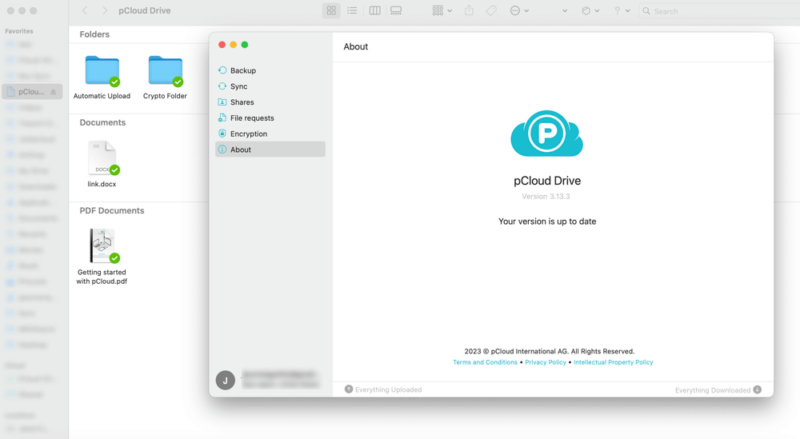
MEGA’s desktop app isn’t as feature-rich as pCloud’s, nor is it a virtual drive. However, it is a great extension of your web-based MEGA account and has plenty of settings and functionality to manage your files from your computer. Additionally, MEGA’s desktop app is excellent for uploading large files, as there are no file size limits imposed.
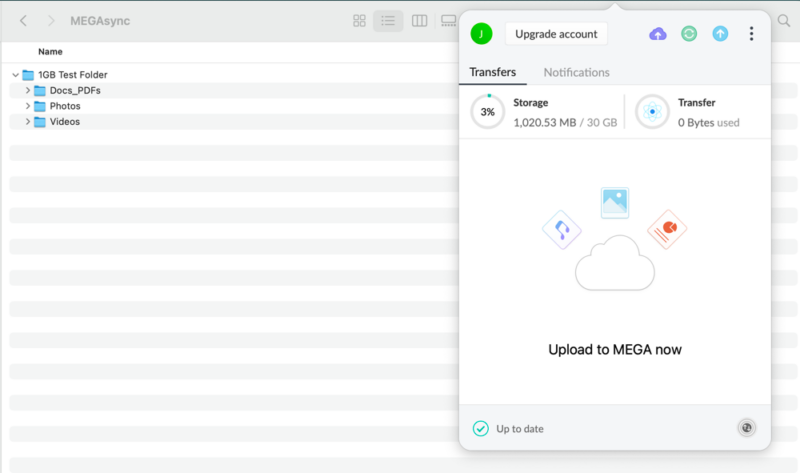
with your data happens in the desktop folder.
MEGA and pCloud both have mobile apps for iOS and Android. Each gives you access to your folder and files, letting you download, upload and share. Both mobile apps support automatic camera uploads, creating a dedicated “photos” folder on your account.
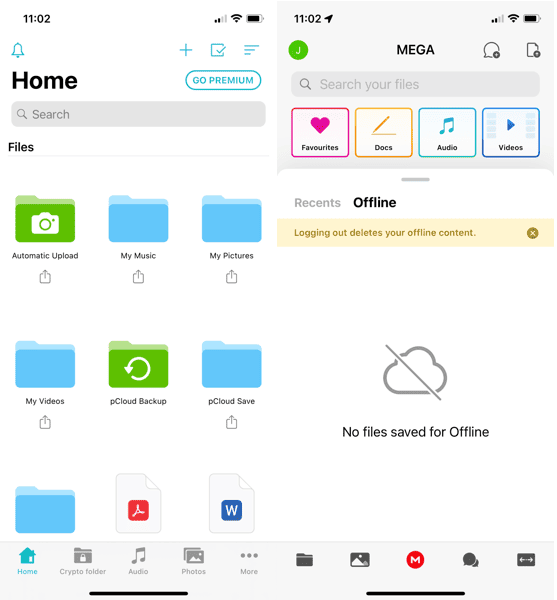
Differences
How pCloud and MEGA implement private encryption is one of the most significant differences between the two services. File sync and free storage are other areas that we compare and contrast below.
pCloud vs MEGA: Private Encryption
pCloud does not have private encryption for the entire account. Instead, it offers its customers the option to purchase pCloud Crypto. Only with its business plans is pCloud Crypto included.
By purchasing Crypto, you can access the Crypto folder on your account. Anything you store in this folder has zero-knowledge encryption and will remain private, only accessible to you.
MEGA does not have a private encryption folder; instead, it applies zero-knowledge encryption to the entire account. MEGA is an excellent place to store sensitive or confidential documents, as only you have the private encryption keys needed to decrypt and access your account. However, if you lose your login credentials, MEGA can’t help you, and you risk losing the contents of your account.
pCloud vs MEGA: File Sync
File sync is a strong feature with pCloud, as it updates your account in real time across your devices. With the desktop app, pCloud includes a sync folder on your device. With it, you can manage your files from your computer.
pCloud supports selective sync, which you access through the desktop app. Selective sync lets you determine which files to keep in the cloud or download to your device.
pCloud also supports block-level sync. Block-level sync only updates the parts of a file you change, which speeds up the process and saves you from having to download and upload the entire file.
MEGA has a sync folder attached to the desktop app. It mirrors the information in your account, and you can manage your folders and files. MEGA also supports selective sync, accessible from the settings in the app. However, MEGA’s desktop app is not a virtual drive, which means whatever you have synced to your computer will take up disk space.
MEGA vs pCloud: Paid Plans
pCloud gives its customers several options for individuals, families and businesses. The most affordable plan has 500GB of storage space for $49.99 when billed annually. The Premium Plus plan also has 2TB of cloud storage space for $99.99 on the annual plan.
Families can choose from two plans that share data with up to five others. Both plan options are available only as lifetime plans, of which pCloud has several. These are a good investment if you plan to stay with the service for a long time, and you can learn more about how the math breaks down in our pCloud lifetime article.
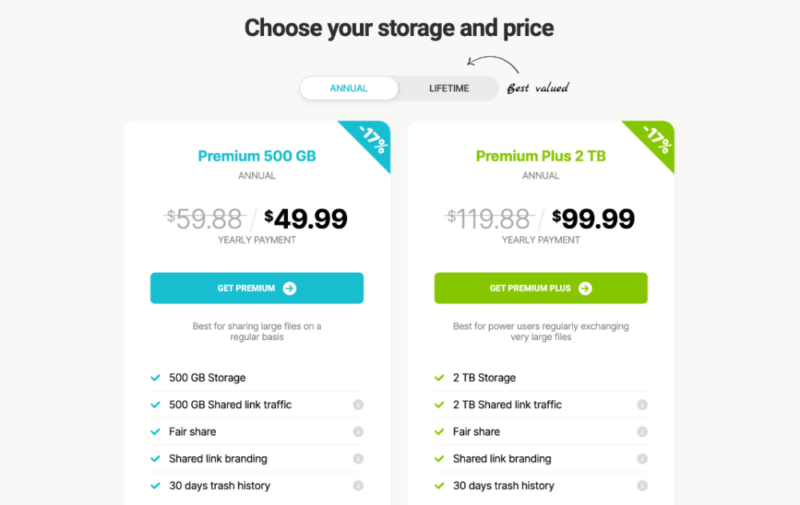
MEGA’s pricing often fluctuates, driven by the exchange rate between your currency and the euro (MEGA bills in euros). At the time of this article, MEGA’s Pro I plan offers 3TB of storage space for $116.88 annually. The Pro II has 10TB for $233.76 and the Pro III comes with 20TB of cloud storage for $350.64.
pCloud and MEGA have plans for businesses. pCloud’s options are Business and Business Pro. The Business plan has 1TB of storage per user and costs $7.99 per user per month, billed annually. The Business Pro plan increases the storage to 2TB per user and costs $15.98 per user monthly, billed annually.
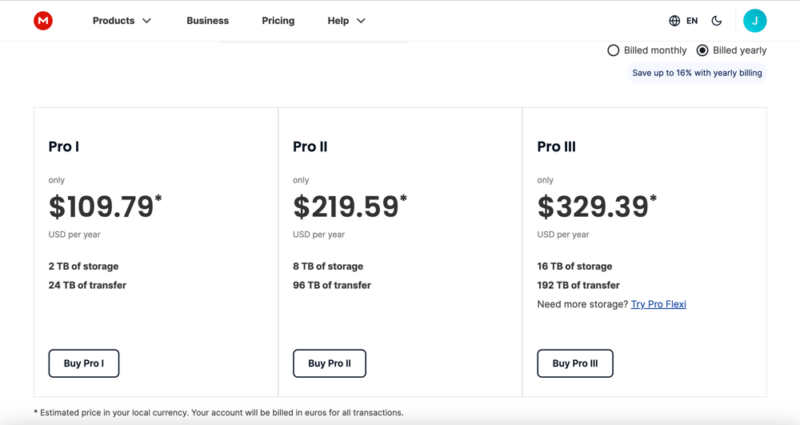
to the exchange rate of your local currency and the euro.
MEGA’s business plan is fully customizable, with the most affordable option supporting three members with 3TB of shared storage. This minimum costs $17.55 per user per month. The cost increases as the number of team members and storage capacity increases.
pCloud vs MEGA: Extra Features
pCloud has plenty of additional features that come with an account, like a dedicated music player that you can use to upload or create playlists. It works within the web browser. With pCloud, you can also play videos without downloading them first. For professionals or businesses, pCloud supports branding folders to customize the appearance for external collaboration.
pCloud also has a backup option for your computer, mobile devices or third-party accounts. You can manage the backup from the desktop app or connect to external accounts like Google Drive or Facebook. The computer backup lets you restore items if needed, although it runs continuously, and you can’t set a predetermined schedule.
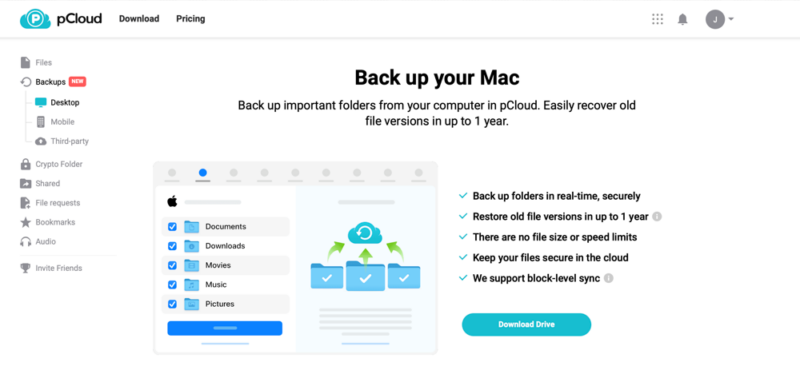
MEGA’s main feature, aside from cloud storage, is the inclusion of a secure chat. It’s a fully end-to-end encrypted chat and conferencing app that lets you privately communicate with other MEGA members or invite others to a secure virtual meeting.
MEGA also has backup capabilities that you set up and manage from the desktop or app. It works similarly to pCloud, where you can select the folders or areas of your computer you want to back up. Like with pCloud, you can’t set a schedule or manage it using the desktop interface. However, MEGA does let users schedule backups using the command line.
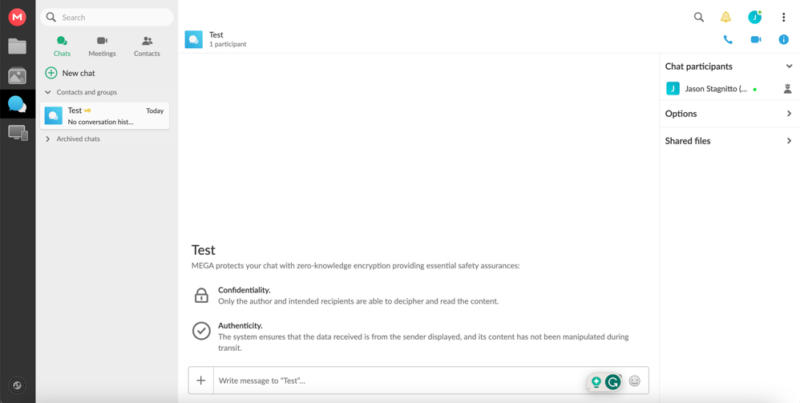
Which Is Better: MEGA vs pCloud?
pCloud is better than MEGA and is the overall winner, with a few more features and better affordability putting it ahead. pCloud’s desktop app lets you keep items in the cloud and saves space on your hard disk. A dedicated music player and video playback on the website make it a slightly more well-rounded cloud storage solution.
pCloud is an affordable cloud storage service with an optional private encryption folder and great cloud features like easy file sharing and sync. If you purchase pCloud Crypto, you’ll gain access to the private encryption folder.
With a generous 20GB of free cloud storage, MEGA makes trying out the cloud service easy. It provides zero-knowledge encryption for the entire account and has a great secure chat and conferencing app.
We Recommend pCloud If You Want…
- Cloud features: pCloud supports personal or professional branding for folders and has a dedicated music and video player on the web app.
- Affordable plans: pCloud has several affordable plans for different customers. It also offers lifetime plans, for long-term users.
- File sync: Using pCloud’s desktop app lets you choose the folders you want to sync with your account. You can leave them in the cloud and still access your data on your computer.
We Recommend MEGA If You Want…
- Free plan: MEGA’s 20GB of free storage is about as good as it gets for free cloud storage.
- Private encryption: Every MEGA account has private encryption for the whole account without additional costs, even for free accounts.
- Secure chat: MEGA’s secure chat app lets you securely communicate with others or host private video conferences.
If You Want to Consider Other Services, Check Out…
Like MEGA, Sync.com has end-to-end private encryption for the entire account, even the 5GB free plan. Sync.com has strong security, file sharing and generous file versioning, making it one of the best cloud storage options for versioning. Read about these features and more in our Sync.com review and Sync.com vs MEGA comparison.
Icedrive has a similar encryption folder to pCloud. It is not available for free accounts. However, the encryption folder does come with all paid accounts. Icedrive is one of the fastest cloud storage services, which is remarkable given its strong security and privacy. Check out our Icedrive review.
Dropbox was the first cloud storage service to popularize the sync folder and remains one of the best cloud storage services for sync. Dropbox also supports connections to Microsoft 365 and Google Workspace. However, it’s not the best for your privacy. For more, read our Dropbox review.
IDrive mixes elements of a cloud storage solution with online backup features, in one service. It’s a very secure cloud provider, and you can choose zero-knowledge encryption when you first create an account. We cover this and more in our IDrive review.
- 1
- :
- :
- :
- :
- 2
- :
- :
- :
- :
- 3
- :
- :
- :
- :
- 4
- 5
- :
- :
- :
- :
The Verdict: Why We Think pCloud Wins Overall
pCloud edges out MEGA as the overall winner. It has strong security, fast and easy file sharing, and a few more features most account holders will use. However, private encryption will cost you extra, even with some subscriptions. With MEGA, private encryption is included, protecting the entire account.
Do you use pCloud or MEGA? What do you like about either cloud storage service? Do you have any other cloud storage providers to suggest? Let us know in the comments section below. Thanks for stopping by to read our article.
FAQ: pCloud vs MEGA Compared
pCloud has more features overall that appeal to a broader audience. However, if private encryption is the most crucial aspect, MEGA is the easy choice, with whole-account private encryption.
MEGA is a great cloud storage choice for private encryption that protects your account. Secure chat is a great feature that protects your instant message communications with end-to-end encryption.
Yes, we’ve spent many hours working with and reviewing pCloud’s services and privacy policy. There’s nothing that stands out or raises a red flag where we feel pCloud is untrustworthy.



